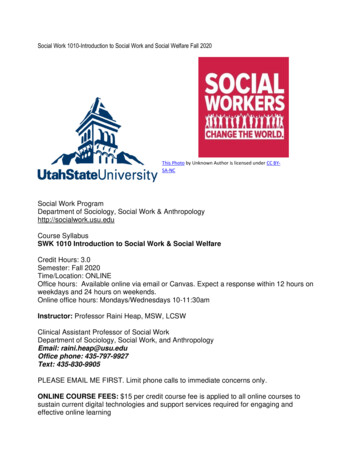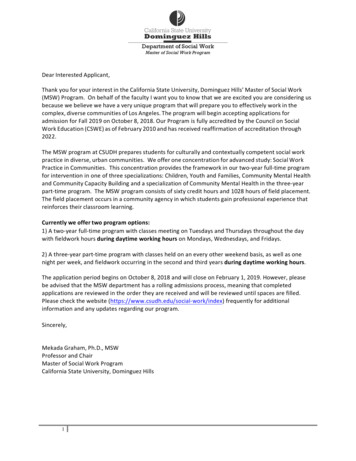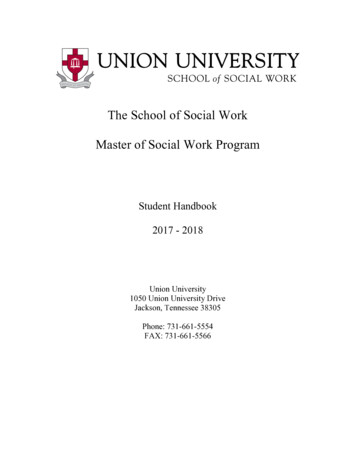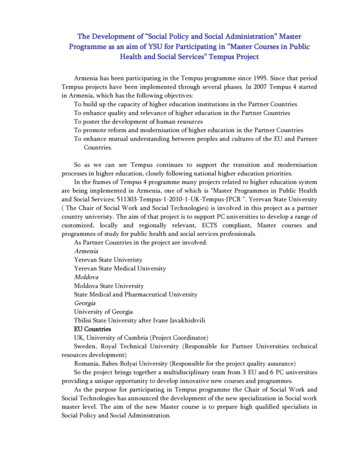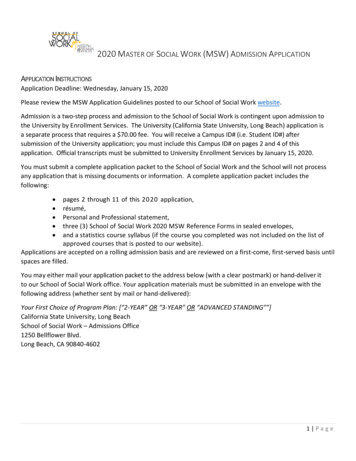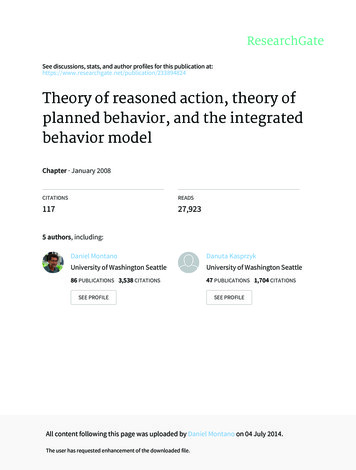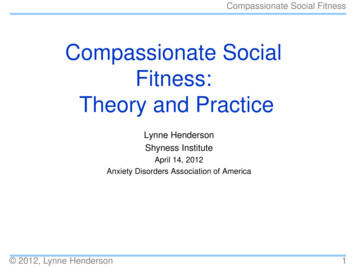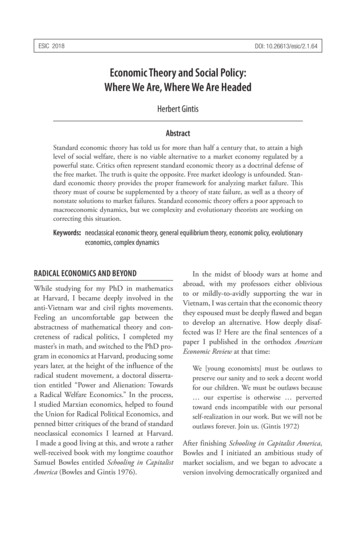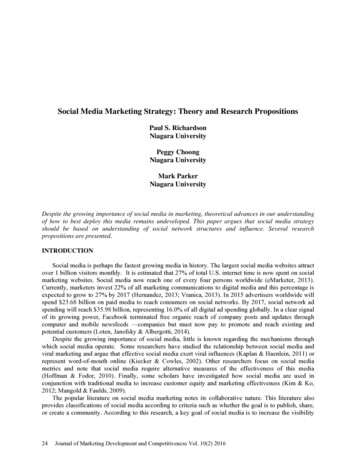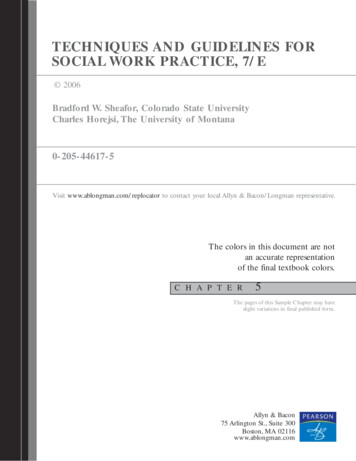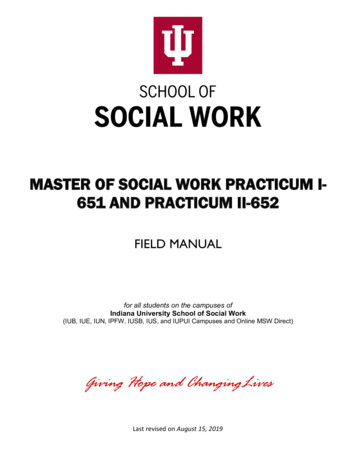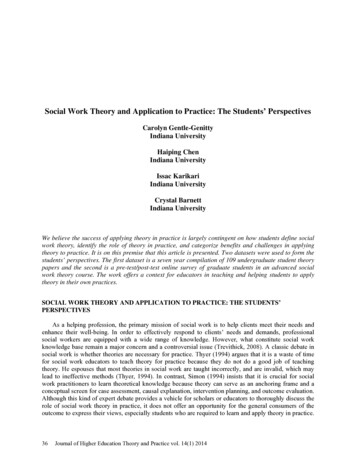
Transcription
Social Work Theory and Application to Practice: The Students’ PerspectivesCarolyn Gentle-GenittyIndiana UniversityHaiping ChenIndiana UniversityIssac KarikariIndiana UniversityCrystal BarnettIndiana UniversityWe believe the success of applying theory in practice is largely contingent on how students define socialwork theory, identify the role of theory in practice, and categorize benefits and challenges in applyingtheory to practice. It is on this premise that this article is presented. Two datasets were used to form thestudents’ perspectives. The first dataset is a seven year compilation of 109 undergraduate student theorypapers and the second is a pre-test/post-test online survey of graduate students in an advanced socialwork theory course. The work offers a context for educators in teaching and helping students to applytheory in their own practices.SOCIAL WORK THEORY AND APPLICATION TO PRACTICE: THE STUDENTS’PERSPECTIVESAs a helping profession, the primary mission of social work is to help clients meet their needs andenhance their well-being. In order to effectively respond to clients’ needs and demands, professionalsocial workers are equipped with a wide range of knowledge. However, what constitute social workknowledge base remain a major concern and a controversial issue (Trevithick, 2008). A classic debate insocial work is whether theories are necessary for practice. Thyer (1994) argues that it is a waste of timefor social work educators to teach theory for practice because they do not do a good job of teachingtheory. He espouses that most theories in social work are taught incorrectly, and are invalid, which maylead to ineffective methods (Thyer, 1994). In contrast, Simon (1994) insists that it is crucial for socialwork practitioners to learn theoretical knowledge because theory can serve as an anchoring frame and aconceptual screen for case assessment, causal explanation, intervention planning, and outcome evaluation.Although this kind of expert debate provides a vehicle for scholars or educators to thoroughly discuss therole of social work theory in practice, it does not offer an opportunity for the general consumers of theoutcome to express their views, especially students who are required to learn and apply theory in practice.36Journal of Higher Education Theory and Practice vol. 14(1) 2014
Because students are receivers and users of social work theory, it is important for them to have a say andlearn about their views about social work theory and application to practice. Views on how do they definesocial work theory, how do they identify the role of theory in practice from their perspectives, and whatthey see as benefits and challenges when applying theory to practice. Instead of a top-down approachsuch as the expert debate, this article aims to explore the role of theory in practice from a bottom-upapproach; that is, from the students’ perspectives. Grounded in this empirical review outlined below, thisarticle is followed by a literature review, methodology, data analysis/findings, discussion and limitations,and a conclusion organized largely around four parts: defining social work theory, identifying the role ofsocial work theory in practice, benefits of applying social work theory to practice, and challenges ofapplying social work theory to practice.LITERATURE REVIEWDefining Social Work TheoryWhen formulating theories there are at least four basic components: formulating concepts, facts,hypotheses, and principles (Turner, 1996). Concepts are agreed upon terms often used within a discipline;facts are information gathered, tested, or researched in relation to phenomena, and evaluated for influenceand correctness; hypotheses are the structural way of using the information to link observations for testingand evaluation; and principles are the stated research outcomes and findings (Turner, 1996). However,there is not such a clear and consistent path when defining theory. Tripodi, Fellin, and Meyer (1969)define theory as an interlocking set of logically related hypotheses, which “seeks to explain the interrelations among empirical generalizations” (p. 13). Barker (1999) consider theory a set of correlatedconcepts, hypotheses, and constructs grounded in observations, as well as facts, which aims to explain aparticular phenomenon. Theory is a framework of interrelated concepts (Lipsey, 1993). They providemeanings and explanations to particular events and helps to solve pertinent problems. Obviously, thedefinitions of theory become complicated and pluralistic when components, functions, and nature oftheory are combined. The following are seven definitions of theory giving an idea of the varied scope indefining theory (See Table 1).TABLE 1DEFINITIONS OF THEORYAuthorsDefinitionsTripodi, Fellin, & Meyer (1969)Theory consists of an interlocking set of hypotheses that arelogically related, and it seeks to explain the inter-relations amongempirical generalizations.Lipsey (1993)Theory is a framework of interconnected concepts that givesmeaning and explanation to relevant event and supports newinsights and problem-solving efforts.Tolson, Reid, & Garvin (1994)Theories are set of concepts and constructs that describe andexplain natural phenomena.Turner (1996)Theory is a model of reality appropriate to a particular discipline.Such a model helps us to understand what is, what is possible, andhow to achieve the possible.Barker (1999)Theory is a group of related hypotheses, concepts, and constructs,based on facts and observations that attempts to explain a particularphenomenon.Journal of Higher Education Theory and Practice vol. 14(1) 201437
Thyer (2001)Theories are attemptsprospectively predict.toretrospectivelyexplainandtoKendall, Adler, Adler, Cargan, &Theory is a set of logically, interrelated statements that attempts toBallantine (2008)describe, explain, and (occasionally) predict social events.Social work uses a broad range of theories from other disciplines and professions, such as: sociology,gerontology, psychology, economics, and so on. In general, there are two major terms used to describetheories in social work profession: human behavior in the social environment (HBSE) theories andpractice theories. Thyer (2001) states that HBSE theories are general theories and can be utilize toexplain and predict a variety of human behaviors. They can help social workers to have a comprehensiveunderstanding of their clients and environments. Thyer’s definition of HBSE theory is often founded andadopted in social work literature (Munro, 2002). Connolly and Harms (2012) further clarified that HBSEtheories should include theories of inner worlds (e.g., psychodynamic approaches), as well as, theories ofouter worlds (e.g., structural inequalities). Practice theories on the other hand, mainly focus on howconceptual theories can inform empirical practices. Practice theories link knowledge about clients’problems and its contexts to knowledge about professional intervention (Simon, 1994). After reviewingthe literature it was clear that the line separating HBSE theories and practice theories is blurred in use andin teaching. These two types of theories are interlocking and overlap. Many definitions of theory in socialwork often include some functions of social work, which makes the main difference between definitionsof theory in general and definitions of theory in social work. The following are eight definitions of theoryin social work from the literature demonstrating this point (See Table 2). Together they help identify therole of theory in social work.TABLE 2DEFINITIONS OF THEORY IN SOCIAL WORKAuthorsSimon (1994)DefinitionsPractice theory links knowledge about an identified problem andits context with knowledge about an intervention with aconceptual format that is oriented towards action and rooted inprevious research.Thyer (2001)Theories pertain to explaining and predicting various aspects ofhuman behaviors.Greene (2008)Theories helped social workers explain why people behave asthey do, to better understand how the environment affectsbehavior, to guild their interventions, and to predict what islikely to be the result of a particular social work intervention.Towland (2009)A theory helps to explain a situation and perhaps, how it cameabout.Howe (2009)Theories are particular ways of making sense. They help socialworkers see regularities and familiar patterns in the muddle ofpractice.Babbie & Rubin (2010)A theory is a systematic set of interrelated statements intendedto explain some aspect of social life or enrich our sense of howpeople conduct and find meaning in their daily lives.38Journal of Higher Education Theory and Practice vol. 14(1) 2014
Teater (2010)Miley, O’Melia, & DuBois (2011)Theory is an essential ingredient in practice that guides the wayin which social workers view and approach individuals, groups,communities, and societies. Theory helps to predict, explain,and assess situations and behaviors, and provide a rationale forhow the social worker should react and intervene.A theory represents a plausible explanation about therelationship between a set of facts and a framework for change.Identifying the Role of Social Work Theory in PracticeThe role of theory in practice continues to be an on-going discussion in the profession. There are twomajor camps in the dialogue of theory application in practice. One camp insists theory-free in practice,and the other emphasizes theory-driven in practice. The theory-free camp eliminates the role of socialwork theory in practice. Thyer (2001) states most etiological theories and intervention theories are wrong,so it is neither essential nor necessarily desirable for practice to be theoretically driven. Rosen andcolleagues (1995) found that there were rarely any clear theoretical reasons in practitioners’ rationales forpractice decisions. In contrast, the theory-driven camp emphasizes the indispensable role of social worktheory for practice. Boisen and Syers (2004) think “social work education rests on the assumption thatcompetent social work practice is grounded in the intentional use of theory. Practice informed by theorydistinguishes professional social work from informal forms of helping” (p. 205).Again, irrespective of the fierce the dialogue, an agreement has been made that there is nodichotomous answer to end the debate claiming social work practice must be either theory-free or theorydriven. In recent years, however, there has been a trend that theory and practice should be integrated,which implies that social work theory should play certain roles in practice. Lam (2004) states that “notonly are social workers expected to be informed about relevant theories, but they must apply thesetheories to practice so that unfavorable conditions in our society can be ameliorated” (p. 317). As a matterof fact, Puolter (2005) thinks learning and applying social work theory in practice is an on-goingreflective evaluation of practice guided by current and emerging theoretical knowledge and research tolearn when and how to add or replace theory and practice strategies for practice effectiveness. This bridgeemphases that practitioners are engaged in a quest of self and practice-correction and improvement donemost effectively through the use and replacement of tested and researched strategies and approachesfound in theory application (Sung-Chan & Yuen-Tsang, 2008).Benefits of Applying Social Work Theory to PracticeDue to the positive roles of theory in practice mentioned above, there is no doubt that applying theoryto practice is beneficial to social workers. The value of theory application in practice is that it: (1)explains clients’ situations and predicts their behaviors; (2) provides a starting point for social workers;(3) helps social workers have an organized plan to their work and reduces the wandering that can happenin practice; (4) offers social workers a clear framework in a chaotic situation and provides accountabilityto their work; (5) gives social workers a perspective to conceptualize and address clients’ problems withappropriate interventions; and (6) identifies knowledge gaps about practice (Walsh, 2010; Turner, 1996;Gilson & DePoy, 2002; Kendall, et al., 2008, Royse, 2011). Without the integration of theory andpractice, social workers are easily and overly affected by their own attitudes, moods, and reactions, whichmay result in infectiveness, inefficiency, even harm clients (Walsh, 2010).For example, the theory of ego psychology, which assumes clients better achieve their goals if theyreflect on their ways to address life challenges, can guide social workers to utilize the interventionstrategy called person-situation reflection to help clients understand their situations and solve theirproblems (Walsh, 2010). Or using critical race theory, social workers can have an individual-contextperspective to rethink power differentials, understand cultural diversity, empower marginalizedJournal of Higher Education Theory and Practice vol. 14(1) 201439
populations, and promote social justice, all of which are emphasized by the 2008 CSWE EducationalPolicy and Accreditation Standards (Ortiz & Jani, 2010). Or with the aid of ecological theory, socialworkers are able to have a whole picture of systems and member functioning and find out effective waysto develop reciprocal transactions and relations between clients and their environments (Ashford &LeCroy, 2010). As such, it is obvious that social work theory can serve as anchoring frame and theoreticalunderpinnings in directing social work practice.Challenges of Applying Social Work Theory to PracticeWhen theory is applied to practice, one of the biggest challenges facing social work students isintegrating theory with practice in an effective way. Although many social work programs espouse theimportance of integrating theory with practice in their field courses, there are still difficulties in realizingsuch integration. Vayda and Bogo (1991) state that social work students often experience thedisconnection between classroom and practicum, and frequently experience difficulty in applyingconcepts learnt in the classroom to practice. Munro (2002) points out social work students cannotexplicitly and systematically apply any relevant theory when they work with clients unless practicesupervisors provide a clear theoretical framework. What is worse, because of disconnection betweenclassroom and practicum, social work students are more likely to “see theories as irrelevant to theirpractice and as merely some kind of game played by academics” (Munro, 2002, p. 462).In addition, when applying theory to practice, social work students often lack the ability to identify,understand, and use relevant theories to their work with clients (Boisen & Syers, 2004). Because onetheory alone may not understand clients’ situations, social work students are likely to draw on multipletheories. Although the use of various theories allows for flexibility and comprehensiveness, it presents abig challenge for social work students to achieve real mastery of theory application in practice especiallywhen different theories are incompatible with each other (Walsh, 2010; Boisen & Syers, 2004). Actually,social work students are often overwhelmed with theoretical knowledge learnt in limited time and havedifficulty in selecting most useful information for their practice (Lam, 2004; Boisen & Syers, 2004; Caspi& Reid, 1998).MethodologyTwo datasets were used to form the students’ perspectives – one qualitative and the latter quantitative– both of which were collected in a social work program at a Midwestern University. The first dataset is aseven year compilation of 109 student theoretical papers from an undergraduate social work theory andpractice course. All students who took this course from 2007 to 2013 and who completed the assignmentswere included in the analysis. There were incentives for participation. The second dataset is a pretest/post-test online survey with a control and an intervention group of graduate level students enrolled inan advanced social work theory course. Using an online randomization tool, students from three courseswere automatically chosen to be in the intervention or control group. Only the experimental groupreceived an online module on theory application. The control group received regular course contentpresented in the context of the course in which they were enrolled. Students completed the 15 item surveyon social work theory and application to practice and were asked to apply theory to solve a case andreflect on their theoretical application. A total 67 students were invited of which 44 students completedthe pre-test and 27 completed the post-test. These students completed the survey on social work theoryand application to practice. The key questions they answered included: (1) what is theory? (2) what arethe common types of social work theory? (3) how do social workers apply theory to practice? (4) howshould social workers evaluate theory? and, (5) can lack of theoretical application and evaluation causeharm in practice?40Journal of Higher Education Theory and Practice vol. 14(1) 2014
DATA ANALYSIS & RESULTSDefining Social Work TheoryIt was evident from the literature on the definitions of theory in general and social work in particularthat many were written by varied scholars or educators but did not adequately reflect the views of socialwork students who are required to learn theory for practice. In the empirical study, 44 social workstudents were questioned on what they thought the common types of social work theories were and whatthey thought theory was. Approximately 77.3% of students (n 34) thought social work theory shouldinclude both practice and HBSE theories. 20.5% students (n 9) thought social work theory only meantHBSE theories. None of them thought practice theories equaled to social work theory. Most social workstudents placed high value on the integration of theory and practice, which meant social work theoryshould not only include theoretical knowledge but also practical knowledge. In addition, almost allstudents (n 43) felt that HBSE theories were the indispensable component of social work theory.In defining theory, 56.0% of the students surveyed (n 25) thought social work theory was acomplicated concept. They thought that theory was a roadmap of sorts for understanding humanbehaviors and that it included a set of concepts and constructs that described and explained situations.They also felt it was a model of reality used to help describe human behaviors, and worked as aframework to explain past behaviors and predict future behaviors. Yet almost 25.0% of the studentssurveyed (n 11) thought social work theory was only a set of concepts and constructs that described andexplained situations. From these students’ perspectives, human behaviors and the social environmentseemed to be the two key words in social work theory, while social work theory seemed to be a tool todescribed, explained, explore, and predict human behaviors and situations (or environment). This viewcarried through in how they defined the role of social work theory in practice.Identifying the Role of Social Work Theory in PracticeAs the receivers and users of social work theory, social work students have their own understandingsof the role of theory in practice. In the online survey, almost 75.0% of students (n 33) agreed that lackof theory application and evaluation could cause harm in practice. From the dataset of student theorypapers, students further described their thoughts about the role of social work theory in practice as follows(See Table 3).TABLE 3STUDENTS’ VIEWS ON THE ROLE OF SOCIAL WORK THEORY IN PRACTICEStudentsShelly3 (2013)CommentsHuman behavior is way too complex for any of us to understand in itsentirety so a theory is just a perspective or a “lens” that we assume so that wecan narrow down what we’re looking at and do the best we can atunderstanding people and their experiences.Kaitlin6 (2013)Theory allows a social worker to understand and explore meanings behind aclient unique situation. Theory can provide much more than just categorizedinformation and is a vital key to success in this career.Nicole11 (2013)Without incorporating theory in practice, social workers would be foundincompetent and much less effective at working with clients and groups.Leila17 (2013)Each theory consists of different facts and concepts, and serves as a modelthat practitioners can use to guide their practice.Erin18 (2013)Theories provide a holistic approach to analyzing the client and usingtheories to better serve clients.Journal of Higher Education Theory and Practice vol. 14(1) 201441
April12 (2013)The utilization of theory allows for the practitioners to be able to reference aguild to explain a client’s behavior, the effects of the client’s environment,and how to determine what is likely to be the result of the intervention.From the students’ perspectives, social work theory does play an important role in practice: (1) it is atheoretical tool to understand complicated human behaviors and social environment, both of which are thecore factors influencing clients’ lives and problems; (2) it is a critical kind of knowledge with whichcompetent social workers should be equipped to effectively work with clients; (3) it is a practicalguideline to help social workers analyze cases, understand clients, develop interventions, and increaseeffectiveness; and (4) it is a conceptual screen to identify the most useful information, which can be usedto understand clients’ situations and solve their problems. In essence, the role of social work theory inpractice is just as a student described in his paper: “Theory in social work is like the rudder that guidesthe boat to its destination. It gives the captain (social worker) and its passenger (client) a sense ofdirection, purpose, and a form of control”. So what are the benefits of applying such important conceptsto our work?Benefits of Applying Social Work Theory to PracticeThe students’ views are somewhat similar in their understanding of the benefits of applying theory topractice (See Table 4).TABLE 4STUDENTS’ VIEWS ON THE BENEFITS OF APPLYING SOCIAL WORKTHEORY TO PRACTICEStudentsJonathan2 (2013)CommentsAnother benefit of using theory is that it gives a sense of security andincrease effectiveness. It also shows clients that a social worker iscompetent.Shelly3 (2013)Theory can also provide a confidence to practitioners that they are groundedin their approach.Shanteal4 (2013)Another benefit of using theory is that it allows us to explain our activities toothers, transfer our knowledge and skills, and have others evaluate ouractivities. By using theories that have been supported by empiricalobservations, social workers are able to feel confident with their ability towork with clients.Rachel1 (2013)Using theory in practice can help social workers create a treatment plan,increase sense of security, and explain and predict occurrences in the client’slife.Jess8 (2013)Having knowledge of various theories and how they apply to different clientsand situations can help social workers determine a course of action withclients.Kaylin13 (2013)It provides explanation and reasoning as to why a client behaves in the waythey do. Utilizing a particular theory in practice can also help when decidingwhat treatment to use for a client.42Journal of Higher Education Theory and Practice vol. 14(1) 2014
From the students’ perspectives, there are four major benefits of applying social work theory topractice. First, applying theory to practice can increase effectiveness of social work intervention. Onestudent in her paper cited Green (2008) believing that social work theory explains why clients behave asthey do, describes how social environment influence clients’ behaviors, implies how social workers canmake intervention plans, and predicts what is likely to be the results of intervention. As a result, byapplying theory to practice, social workers can have a clear and systematic framework to help themeffectively analyze cases, develop interventions, and evaluate outcomes.Second, applying theory to practice can promote confidence among social workers. Social worktheory is a systematic body of knowledge which is grounded in professional experiences, empiricalresearch, and logical analysis, so it can be used as an important indicator showing that social workers arecompetent and professional. Being equipped with theory, social workers can feel more confident abouttheir professional knowledge and skills when working with clients.Third, applying theory to practice provides a good opportunity for social workers to transfertheoretical knowledge to solve practical problems. Social workers can use theory to conceptualize andaddress clients’ concerns, which makes theoretical knowledge applicable and useful. In particular, theoryapplication in practice helps social work students connect classroom to real world.Fourth, applying theory to practice helps social workers make an in-depth reflection and evaluationon theory learning and application, which can enhance the effectiveness of theory application in practice.Social work theories are not written in stone, so they need to adjust to the changes in real life. Byapplying theory in practice, social workers are able to know which parts of theory can help themeffectively respond to clients’ problems, and which parts of theory are out of date. In this way, socialworkers also have an opportunity to contribute to theory progression. As there are benefits, there are alsochallenges to theory application.Challenges of Applying Social Work Theory to PracticeBesides the integration of theory with practice, social work students also face other challenges. Inorder to better understand the challenges of applying social work theory to practice, a case example wasdesigned in the empirical study. Forty-four social work students were asked to solve this case by applyingrelevant theory. They were also asked to answer questions about their reflections on theory application topractice. One of these questions was: “Having read the case above, do you think you have a model ormethod to respond to using theory?” Some 45.5% of students (n 20) thought they had a theoreticalmodel in their minds when they had read this case. Another, 11.4% of students (n 5) thought they mighthave or might not have had a theoretical model in their minds. Also, 43.2% of students (n 19) had noidea and just skipped this question. Thus, it seemed as if many social work students were unable to locaterelevant theories when encountering a practical case. They seemed to lack a plan, process, or model ofhow to respond to cases in order to apply theory. At the end of the empirical survey with MSW students,an open question was asked about students’ general thoughts and feedbacks on theory application topractice. A text analysis of the 11 comments shared found five common themes: Believe theory, socialwork, clients, knowledge, and practice). Respectively the students reported (See Table 5).TABLE 5MSW STUDENTS’ GENERAL THOUGHTS AND FEEDBACKS ON THEORY APPLICATIONStudentsSusan11 (2013)CommentsI believe theory classes should involve some practice to demonstrate how aparticular theory is applicable.April32 (2013)I believe theory is very important for understanding clients and practicing inan appropriate manner.Journal of Higher Education Theory and Practice vol. 14(1) 201443
John15 (2013)I feel as though I am still learning a lot of this as it applies to social work.My S503 course was a good overview of theories, now in S513 I am hopingto learn more about application and evaluation of theories.Jim04 (2013)I thought HBSE was helpful, clarified different theories, and approaches touse with clients. It also provided information to assess client progress, andthe option to shift to a different theory if one was ineffective.I need more practice.Bob93 (2013)In addition to this feedback, the paper dataset of 109 BSW students also mentioned challenges intheory application. Some of the students’ answers are below (See Table 6).TABLE 6STUDENTS’ VIEWS ON THE CHALLENGES OF APPLYING SOCIAL WORKTHEORY TO PRACTICEStudentsElizabeth18 (2007)CommentsIt is a hard area for me to wrap my head around because theory applicationprocess is fluid. There are many theories to be considered, and there are rarely100% correct answers.Manda17 (2007)I am still a little unaware of which theory to use in which situation.Kaylin13 (2013)There are some risks when theory is relied on too much in practice. If apractitioner relies too heavily on theory to define a client, then they are limited bythat theory.Nicole 11 (2007)Dogmatic theory causes harm by closing other explanations and dismissing theuse of other ideas.LaQuisha9 (2013)It can limit and not take into account alternative explanations of the situation.Theory closes out other explanations and dismisses those which offer them asheretics.Jess8 (2013)As a practitioner, you could become too focused on implementing the theory anduse it as too strict of a guide for treatment. This can also cause you to begin to seethe clients not as people, but as projects.DiscussionDespite the challenges noted by the BSW students in their assessment there seemed to be no moreimprovement in the MSW level theory courses. In fact when comparing the pre- and post-test from theonline survey it was evident that the students lacked confidence and consistency in their answers. Forinstance when examining the experimental group, to which 22 students were assigned, only four of thethirteen who responded to both the pre and post-test scored higher on the post-test. More specifically nineof thirteen students did better guessing on the pre-test, choosing random answers, than they did on thepost-test after having watched an online module on theory application. Co
social work is whether theories are necessary for practice. Thyer (1994) argues that it is a waste of time for social work educators to teach theory for practice because they do not do a good job of teaching theory. He espouses that most theories in social work
